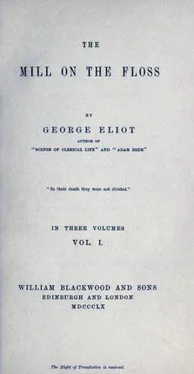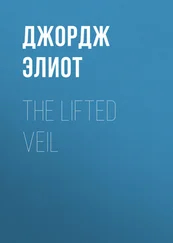"Ah, Mr. Philip!" said Mr. Deane, when they entered the dining-room, "I've not seen you for a long while. Your father's not at home, I think, is he? I went after him to the office the other day, and they said he was out of town."
"He's been to Mudport on business for several days," said Philip; "but he's come back now."
"As fond of his farming hobby as ever, eh?"
"I believe so," said Philip, rather wondering at this sudden interest in his father's pursuits.
"Ah!" said Mr. Deane, "he's got some land in his own hands on this side the river as well as the other, I think?"
"Yes, he has."
"Ah!" continued Mr. Deane, as he dispensed the pigeonpie, "he must find farming a heavy item, — an expensive hobby. I never had a hobby myself, never would give in to that. And the worst of all hobbies are those that people think they can get money at. They shoot their money down like corn out of a sack then."
Lucy felt a little nervous under her father's apparently gratuitous criticism of Mr. Wakem's expenditure. But it ceased there, and Mr. Deane became unusually silent and meditative during his luncheon. Lucy, accustomed to watch all indications in her father, and having reasons, which had recently become strong, for an extra interest in what referred to the Wakems, felt an unusual curiosity to know what had prompted her father's questions. His subsequent silence made her suspect there had been some special reason for them in his mind.
With this idea in her head, she resorted to her usual plan when she wanted to tell or ask her father anything particular: she found a reason for her aunt Tulliver to leaving the dining-room after dinner, and seated herself on a small stool at her father's knee. Mr. Deane, under those circumstances, considered that he tasted some of the most agreeable moments his merits had purchased him in life, notwithstanding that Lucy, disliking to have her hair powdered with snuff, usually began by mastering his snuff-box on such occasions.
"You don't want to go to sleep yet, papa, do you?" she said, as she brought up her stool and opened the large fingers that clutched the snuff-box.
"Not yet," said Mr. Deane, glancing at the reward of merit in the decanter. "But what do you want?" he added, pinching the dimpled chin fondly, — "to coax some more sovereigns out of my pocket for your bazaar? Eh?"
"No, I have no base motives at all to-day. I only want to talk, not to beg. I want to know what made you ask Philip Wakem about his father's farming to-day, papa? It seemed rather odd, because you never hardly say anything to him about his father; and why should you care about Mr. Wakem's losing money by his hobby?"
"Something to do with business," said Mr. Deane, waving his hands, as if to repel intrusion into that mystery.
"But, papa, you always say Mr. Wakem has brought Philip up like a girl; how came you to think you should get any business knowledge out of him? Those abrupt questions sounded rather oddly. Philip thought them queer."
"Nonsense, child!" said Mr. Deane, willing to justify his social demeanor, with which he had taken some pains in his upward progress. "There's a report that Wakem's mill and farm on the other side of the river — Dorlcote Mill, your uncle Tulliver's, you know — isn't answering so well as it did. I wanted to see if your friend Philip would let anything out about his father's being tired of farming."
"Why? Would you buy the mill, papa, if he would part with it?" said Lucy, eagerly. "Oh, tell me everything; here, you shall have your snuff-box if you'll tell me. Because Maggie says all their hearts are set on Tom's getting back the mill some time. It was one of the last things her father said to Tom, that he must get back the mill."
"Hush, you little puss," said Mr. Deane, availing himself of the restored snuff-box. "You must not say a word about this thing; do you hear? There's very little chance of their getting the mill or of anybody's getting it out of Wakem's hands. And if he knew that we wanted it with a view to the Tulliver's getting it again, he'd be the less likely to part with it. It's natural, after what happened. He behaved well enough to Tulliver before; but a horsewhipping is not likely to be paid for with sugar-plums."
"Now, papa," said Lucy, with a little air of solemnity, "will you trust me? You must not ask me all my reasons for what I'm going to say, but I have very strong reasons. And I'm very cautious; I am, indeed."
"Well, let us hear."
"Why, I believe, if you will let me take Philip Wakem into our confidence, — let me tell him all about your wish to buy, and what it's for; that my cousins wish to have it, and why they wish to have it, — I believe Philip would help to bring it about. I know he would desire to do it."
"I don't see how that can be, child," said Mr. Deane, looking puzzled. "Why should he care?" — then, with a sudden penetrating look at his daughter, "You don't think the poor lad's fond of you, and so you can make him do what you like?" (Mr. Deane felt quite safe about his daughter's affections.)
"No, papa; he cares very little about me, — not so much as I care about him. But I have a reason for being quite sure of what I say. Don't you ask me. And if you ever guess, don't tell me. Only give me leave to do as I think fit about it."
Lucy rose from her stool to seat herself on her father's knee, and kissed him with that last request.
"Are you sure you won't do mischief, now?" he said, looking at her with delight.
"Yes, papa, quite sure. I'm very wise; I've got all your business talents. Didn't you admire my accompt-book, now, when I showed it you?"
"Well, well, if this youngster will keep his counsel, there won't be much harm done. And to tell the truth, I think there's not much chance for us any other way. Now, let me go off to sleep."
Chapter VIII. Wakem in a New Light
Before three days had passed after the conversation you have just overheard between Lucy and her father she had contrived to have a private interview with Philip during a visit of Maggie's to her aunt Glegg. For a day and a night Philip turned over in his mind with restless agitation all that Lucy had told him in that interview, till he had thoroughly resolved on a course of action. He thought he saw before him now a possibility of altering his position with respect to Maggie, and removing at least one obstacle between them. He laid his plan and calculated all his moves with the fervid deliberation of a chess-player in the days of his first ardor, and was amazed himself at his sudden genius as a tactician. His plan was as bold as it was thoroughly calculated. Having watched for a moment when his father had nothing more urgent on his hands than the newspaper, he went behind him, laid a hand on his shoulder, and said,–
"Father, will you come up into my sanctum, and look at my new sketches? I've arranged them now."
"I'm getting terrible stiff in the joints, Phil, for climbing those stairs of yours," said Wakem, looking kindly at his son as he laid down his paper. "But come along, then."
"This is a nice place for you, isn't it, Phil? — a capital light that from the roof, eh?" was, as usual, the first thing he said on entering the painting-room. He liked to remind himself and his son too that his fatherly indulgence had provided the accommodation. He had been a good father. Emily would have nothing to reproach him with there, if she came back again from her grave.
"Come, come," he said, putting his double eye-glass over his nose, and seating himself to take a general view while he rested, "you've got a famous show here. Upon my word, I don't see that your things aren't as good as that London artist's — what's his name — that Leyburn gave so much money for."
Philip shook his head and smiled. He had seated himself on his painting-stool, and had taken a lead pencil in his hand, with which he was making strong marks to counteract the sense of tremulousness. He watched his father get up, and walk slowly round, good-naturedly dwelling on the pictures much longer than his amount of genuine taste for landscape would have prompted, till he stopped before a stand on which two pictures were placed, — one much larger than the other, the smaller one in a leather case.
Читать дальше












